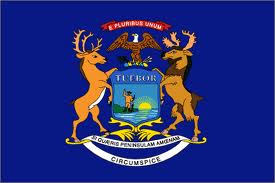Online Poker Michigan Gambling Laws
Update: Is Online Poker Legal in Michigan?
Online poker Michigan is totally legal! Michigan Gov. Gretchen Whitmer made it official after she signed HB. 4311 in Dec. 2019. Michigan is now the sixth state to legalize online poker.
However, there’s still some time before regulated sites pop up. WSOP MI launched July 12 of 2021.
Pictured Rocks National Lakeshore, Michigan (Photo by Dennis Buchner on Unsplash)
Gambling Laws and Poker in Michigan
Michigan is pretty open to gambling. That’s why it’s one of the few states that allows nearly all kinds of online gambling. For example, everything from lotteries, sports betting, pari-mutuel, online casino, sportsbooks, real money poker and charitable gambling is legal in Michigan.
Additionally, there are Native American Class III casinos, private casinos and race tracks. As a result, you have plenty of options if you want to gamble in Michigan. Interestingly, online gaming wasn’t even explicitly outlawed before Hb 4311.
This article by gambling-law-us.com stated:
“In 1999 Michigan adopted SB 562, which made it specifically unlawful to use the Internet to violate certain provisions of Michigan’s anti-gambling laws, including sections 750.301 through 306 and 750.311. In 2000 Michigan adopted Public Act 185 which repealed the references to those anti-gambling sections. Thus, Michigan is not a state that has in effect a specific prohibition against using the Internet to make, offer or accept bets over the Internet.”
Can I Play Poker on PokerStars in Michigan?
Poker players in Michigan still can’t play on PokerStars. But that might change soon! Michigan has legalized online poker games/online casino games, like Texas Hold’em or stud, but it has yet to officially launch. There’s a chance Michigan could license it to run in the state. Before 2011, PokerStars was one of the most popular sites in Michigan and every US state. But after Black Friday, PokerStars has had a hard time making its way back to the US, but it’s slowly coming back. New Jersey was the first state to welcome it back and then Pennsylvania did the same in late 2019. The site has been successful, but the player pool is limited to each state, so it’s not as big as it used to.
Luckily, there are some sites that accept players from all 50 states. So, if you’re in Michigan, sites like Bovada and Ignition Poker are pretty good PokerStars alternatives. They have great tournaments, solid player pools, and smooth software. We break these details down in our extensive reviews. Check out our reviews page for more details, like payouts, welcome bonuses and poker app compatibility.
Legal Gambling in Michigan
Lottery
The Michigan lottery started in 1972. Back then, the P.A. 239 created the Bureau of State Lottery. Subsequently, the bureau governed bingo, lottery and charitable gaming licenses. An estimated 60 percent of lottery revenue goes to winners and about 30 percent goes to the School Aid Fund. After that, the rest is distributed among lottery vendors, retailers and lottery operations. The lottery has kept up with the times too. That’s why in 2014 the bureau authorized online lottery ticket sales.
The lottery brings in a nice chunk of change for the state. The lottery generated $3.58 billion in revenue in 2018 and $941 million went to the schools.
Horse Racing
Horse racing is Michigan’s oldest form of legal gambling. Michiganders have, for example, been betting on horses since 1933. Horse racing used to be incredibly popular in Michigan. There were several race tracks with attendance in the millions. But now the number of race tracks have slowly been closing. Now there’s just one track remaining, the Northville Downs in the Detroit suburbs. But even that’s a bit tenuous since a housing developer recently bought the track. After that, the current location will close soon, but there are plans to relocate the track.
Charitable Gaming
The 1972 Bingo Act created the Charitable Gaming Division. This paved the way for nonprofits to sponsor bingos, casino nights, raffles and fundraising parties. There are an estimated 10,000 licenses issued every year. The licenses go to several organizations like veterans groups, senior citizen homes, religious groups and political committees.
Indian Casinos
Native American tribes are sovereign nations. As such, Michigan doesn’t have regulatory authority over Indian casinos. However, the state does have oversight authority with the State-Tribal Compact provisions. Meanwhile, those casinos are regulated by the National Indian Gaming Commission and the corresponding tribal communities. There are currently 22 Indian Casinos and 3 private casinos in the state of Michigan. To clarify, 12 different Native American tribes cover the 22 Indian Casinos.
Private Casinos
The 1996 Michigan Gaming Control and Revenue Act paved the way for three privately-owned casinos in the city of Detroit. Additionally, the bill also created the Michigan Gaming Control Board to oversee those casinos. You can read the full Michigan Gaming Control & Revenue Act, it’s only 34 pages long. Alternatively, you can read some highlighted points below:
- Authorizes three licensed commercial casinos in the City of Detroit
- Imposes certain taxes and fees on casinos and others involved in casino gaming
- Gives the Michigan Gaming Control Board exclusive authority to license, regulate, and control the three authorized Detroit casinos
- Requires safeguards by casino licensees to prevent compulsive and underage gambling
- Issues civil and criminal penalties for violation of the Act
- Prohibits political contributions by parties with interests in casino and supplier license applicants and licensees to state and local political candidates and committees
- Provides for the distribution of casino tax revenue for K-12 public education in Michigan, and capital improvement, youth programs, and tax relief in the City of Detroit
- Issues funds for compulsive gambling prevention programs
These casinos have brought in significant revenue. For example, in 2019, Detroit’s three casinos had more than $1.4 billion in revenue. This is a slight increase from the previous year. To clarify, this was an estimated $10 million increase from 2018.
 Michigan Gaming Control Board
Michigan Gaming Control Board
“The Michigan Gaming Control Board shall ensure the conduct of fair and honest gaming to protect the interests of the citizens of the State of Michigan.”
According to the Michigan Gaming Control Board’s website, Governor Snyder signed Executive Order 2012-4 on April 11, 2012. As a result, there was more effective regulation of certain charitable games. For example, the Executive Order transferred regulation of “millionaire parties” from the Michigan Bureau of State Lottery’s Charitable Gaming Division to the Executive Director of the Michigan Gaming Control Board. But the state has also been under scrutiny since its charity gaming revenues increased from $7.9 million in 2004 to $197 million in 2011. On the other hand, regulation of other forms of charitable gaming such as bingo and raffles will remain with the lottery.
For the most up-to-date information and news on Michigan Gambling Laws, visit MichiganGaming.com. They post the latest stories about Michigan gaming and have been around for over 18 years. Most importantly, they have a strong staff of lawyers and gaming analysts.
Benefits to Playing Online Poker in Michigan
Online poker Michigan players are now not only able to play Poker from their own homes, but thanks to a range of mobile poker apps offered by our featured venues listed above you can play on a cell phone or any type of mobile device.
There are many benefits by moving all your poker action online and with bonuses flowing freely to all players living within the Michigan State boundaries. There are plenty of tournaments and lots of real money tables open morning, noon and night.
Geo-Location Check-In
With the apps and sites, there are location requirements and it’s not just them taking your word for it. There is geo-location software when you download or play online and you must allow this software to access your devices IP address. Once they can verify the device is in state, players will then be allowed onto the site or app.
State-by-State Laws
Alabama – Alaska – Arizona – Arkansas – California – Colorado – Connecticut – Delaware – Florida – Georgia – Hawaii – Idaho – Illinois – Indiana – Iowa – Kansas – Kentucky – Louisiana – Maine – Maryland – Massachusetts – Michigan – Minnesota – Mississippi – Missouri – Montana – Nebraska – Nevada – New Hampshire – New Jersey – New Mexico – New York – North Carolina – North Dakota – Ohio – Oklahoma – Oregon – Pennsylvania – Rhode Island – South Carolina – South Dakota – Tennessee – Texas – Utah – Vermont – Virginia – Washington – West Virginia – Wisconsin – Wyoming
FAQs
How old do I have to be play online poker Michigan?
State mandates that players must be 21 and older to play online poker in the state.
Do I have to live in the state to play online in Michigan?
To sign up and make a deposit can be done anywhere, however, to actually play at the tables online, you must be within state lines.
Where can I find trusted and vetted poker sites?
We have a bunch of reviews for greatly trusted poker sites.
Frequently Asked Questions
Yes. You have to pay state and federal tax on your poker income. Federal tax is 25% and state tax will be 4.25%. Wins of $5,000+ or more will be subject to increased oversight. Anything under that amount will be your responsibility to report on your tax return.
Yes. Other US states offer legal online poker rooms, too – legal and regulated by online poker operators.
No, but you will have to be in that state to create an account or sign up to play online poker locally.
Deposit options, welcome bonuses, and deposit bonuses will differ depending on the site, however, for new players, MasterCard, Visa and Paypal are just a few of the many ways to drop your first deposit.
Yes! Players can also find BetMGM MI and PokerStars MI.
As mentioned above, Michigan doesn’t have any regulated casino sites, poker rooms, or sports betting sites. Michigan is yet to regulate its online gambling market.

